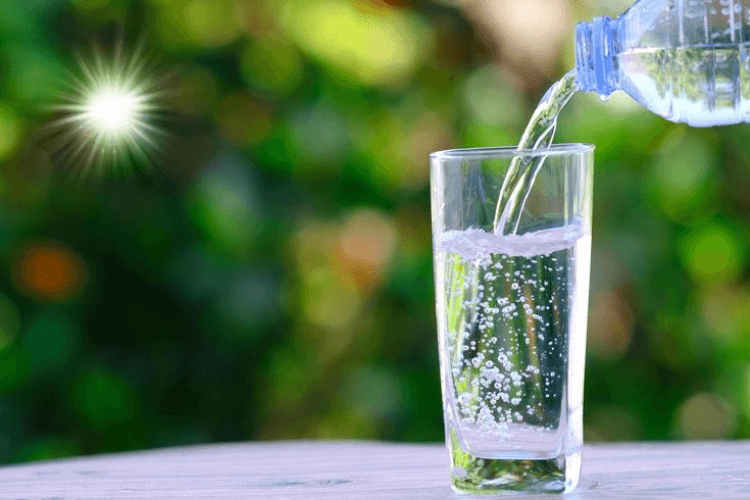HOW MUCH WATER IS IN MY BODY?
The HédonistLabs laboratory
Water makes up a large part of our bodies, infiltrating every cell, tissue and organ to sustain life. But how much water does our body actually contain, and why is it so crucial to maintain this water balance?
How does the amount of water in our bodies influence our vital functions, and what are the risks of a water imbalance for our health?
BODY WATER COMPOSITION
The human body is predominantly composed of water, which underlines its fundamental importance for our survival. On average, the percentage of water in the body varies according to factors such as age, sex and body composition, but is generally between 50% and 70% in adults.
This water is distributed unevenly throughout the body's various tissues and organs. For example, adipose tissue contains less water than muscle tissue. Generally speaking, water-rich organs include the brain, lungs, liver, kidneys and heart, while bones and teeth contain less water. This distribution also varies according to health status and individual metabolic needs.
FUNCTIONS OF WATER IN THE HUMAN BODY
Water performs a range of functions that are essential for the proper functioning of our bodies:
- Body temperature regulation Water plays a crucial role in maintaining body temperature. When we sweat, water evaporates from the skin, helping to dissipate heat and regulate body temperature, which is crucial in preventing overheating and hypothermia.
- Nutrient and waste transport Water is the main constituent of blood and extracellular fluid. It therefore acts as a transport vehicle for nutrients, such as vitamins, minerals and glucose molecules, distributing them to the body's cells. It also helps eliminate metabolic and toxic waste from the body through urine, perspiration and other excretion routes.
- Involvement in cellular biochemical processes Water is a universal solvent in the body, which means it is required for most of the biochemical reactions that take place inside cells. For example, it is involved in food digestion, protein synthesis, pH regulation and many other enzymatic reactions essential to life.
Water is much more than just an inert substance; it's a dynamic element that's indispensable to life, ensuring the proper functioning of many of our body's fundamental biological functions.
REGULATION OF WATER BALANCE
Maintaining an adequate water balance in our bodies is crucial to our health and well-being. This involves precise regulation of water intake and elimination, as well as management of fluctuations in hydration levels. Here are the main mechanisms involved in regulating water balance :
- Water intake and elimination Water intake and elimination: Water intake occurs mainly through the consumption of fluids and food, while water elimination occurs through various routes such as urine, perspiration, respiration and bowel movements. The sensation of thirst is a key regulatory mechanism that prompts us to consume water when our body needs it.
- Role of the kidneys Kidneys: The kidneys play a central role in maintaining water homeostasis, filtering blood to eliminate waste products and regulating the amount of water retained or eliminated in urine. When water levels in the body are low, the kidneys conserve water by reducing the amount of urine produced. On the other hand, when there is an excess of water, the kidneys eliminate the excess water through more abundant urine.
- Regulatory hormones ADH (antidiuretic hormone), produced by the pituitary gland, plays a crucial role in water retention. In the event of dehydration or high concentrations of solutes in the blood, ADH is released to signal the kidneys to reabsorb more water, thus reducing urine production and preserving body water. Conversely, when water levels are high, ADH release is reduced, resulting in increased urine production and elimination of excess water.
FACTORS INFLUENCING WATER REQUIREMENTS
Water requirements vary from person to person and are influenced by a number of factors. Here are some of the main factors to consider:
- Individual variables Water requirements are closely linked to individual factors such as weight, age and level of physical activity. Larger, heavier people generally need more water to maintain hydration, as do more active individuals who sweat more and therefore lose more water through perspiration.
- Effects of temperature and humidity Environmental conditions such as ambient temperature and humidity can influence water requirements. For example, in hot, dry weather, the body tends to sweat more to regulate its temperature, which increases water loss and therefore hydration needs. Similarly, in very humid environments, perspiration may not evaporate efficiently, which can also increase water requirements.
- Consumption of substances affecting fluid balance Alcohol and caffeine consumption can affect water balance by increasing urine production and, if consumed in excess, leading to dehydration. These substances have a diuretic effect, which means they increase urine production and can therefore increase water requirements to compensate for additional losses.
CONSEQUENCES OF DEHYDRATION AND OVERHYDRATION
- Dehydration :
- Symptoms Symptoms of dehydration include thirst, dry mouth, dry skin, fatigue, dizziness, headache, confusion, decreased urine production and dark urine.
- Health risks Severe dehydration can lead to serious complications, including electrolyte disorders, kidney failure, heat stroke, convulsions and even coma in the most severe cases. It can also affect cognitive ability and physical performance.
- Overhydration and hyponatremia :
- Adverse effects Overhydration, or excess water in the body, can lead to a condition called hyponatremia, characterized by an abnormally low concentration of sodium in the blood. This can occur when water is consumed in excess of sodium losses, or when the kidneys fail to eliminate enough water. Symptoms of hyponatremia include nausea, vomiting, headaches, confusion, convulsions and, in severe cases, coma or even death.
- Health risks: Hyponatremia can be a serious and potentially life-threatening medical condition if not treated promptly. It can cause swelling of the brain (cerebral edema) due to the accumulation of water in brain cells, making it life-threatening.
WATER CONSUMPTION RECOMMENDATIONS
- General guidelines General recommendations for optimal hydration vary, but it is commonly recommended to drink about 8 glasses of water a day, which corresponds to about 2 liters. However, water requirements vary from person to person, depending on factors such as weight, age, level of physical activity and environmental conditions.
- Adapting to environmental conditions and individual needs Adapting to environmental conditions: It's important to adapt water intake to environmental conditions. For example, in hot weather or during intense physical activity, water requirements increase to compensate for losses through perspiration. Similarly, in the event of illness, fever or pregnancy, water requirements may also be increased. So it's essential to listen to your body and drink enough water to meet its specific needs.
- Suggestions for monitoring your hydration and adjusting your intake accordingly :
- Watch for signs of dehydration such as thirst, dry mouth, fatigue and dark urine.
- Monitor urine color: Clear or light-colored urine generally indicates good hydration, while dark urine can be a sign of dehydration.
- Establish a routine: Drinking water regularly throughout the day, rather than waiting until you feel thirsty, can help maintain adequate hydration.
- Consider other sources of hydration: In addition to water, fruit juices, soups, water-rich fruits and vegetables also help to keep the body hydrated.
In conclusion, water is an essential element in our bodies, accounting for a significant proportion of our body composition and playing a vital role in many physiological functions. We've looked at several key aspects of the amount of water in our bodies:
- Most of our body's composition is made up of water, with variations depending on tissues and organs.
- Water is involved in regulating body temperature, transporting nutrients and waste products, and in cellular biochemical processes.
- Water balance is maintained by complex regulatory mechanisms involving the kidneys and hormones such as ADH.
- Water requirements vary according to individual factors such as weight, age and activity level, as well as environmental conditions.
- Dehydration and overhydration can have serious health consequences, underlining the importance of monitoring hydration and adjusting intake accordingly.
Maintaining a proper water balance is therefore essential to our health and well-being. By remaining aware of our water needs and adopting appropriate hydration habits, we can help keep our bodies functioning optimally and promote good long-term health.




